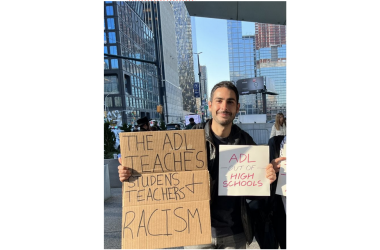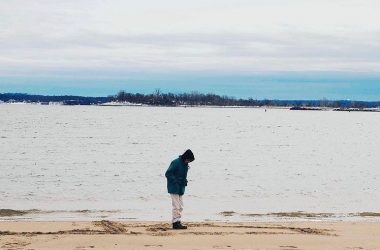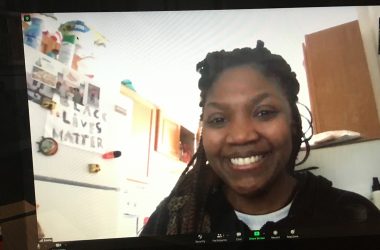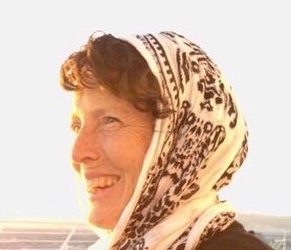Prison, Pandemic, and Why Donna Robinson Can’t Relax
By Susie Day
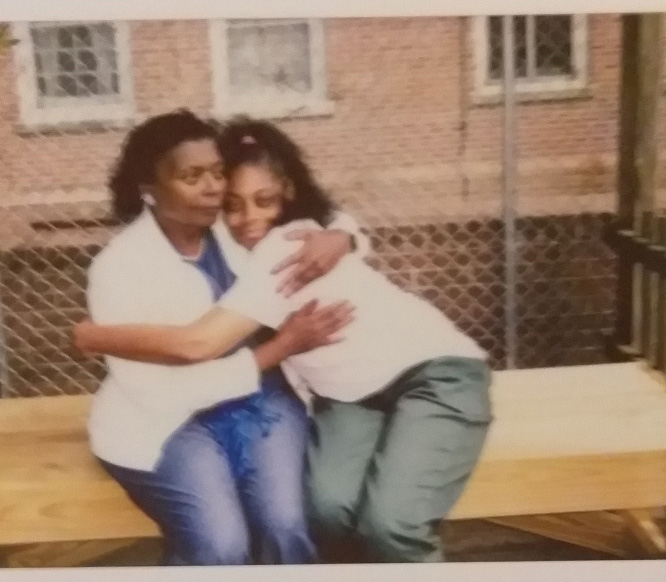
Long before the COVID-19 pandemic forced New York’s Department of Corrections and Community Supervision [DOCCS] to bar ordinary people like us from visiting incarcerated loved ones, Release Aging People in Prison [RAPP] was working tirelessly to get loved ones out. Wait. That’s not quite right: by now, nearly everyone at RAPP is extremely tired. Exhausted, really. They know that prisons – unsanitary, with inept healthcare and virtually no social distancing – cultivate lethal coronavirus clusters. Yet, from a prison population of about 50,000, New York State has seen fit to release only 1,404 – “nonviolent offenders” – leaving thousands of vulnerable people inside.
Donna Robinson, 55, from Buffalo, is a typical RAPP member: exhausted, but not giving up. One of her daughters, Missy, is serving time at NY’s Bedford Hills Correctional Facility. As at any prison, people at Bedford sometimes die. But among the deaths there in the past year, two made the news. This April 28, Darlene “Lulu” Benson-Seay became the first woman incarcerated by NY State to die of COVID-19. And last August, Valerie Gaiter died at 61 of esophageal cancer, which medical staff had insisted was acid reflux. Valerie – who had served 41 years but wasn’t eligible for parole for another decade – was loved and respected at Bedford, and Missy was one of the many younger women Val had mentored.
Early this month, slowly, unsurely, DOCCS began to reopen NY prisons to visitors. But, much as she misses her daughter, Donna doesn’t feel it’s safe going back to Bedford. Neither does Missy. I ask Donna to tell me more about her daughter…
DONNA ROBINSON: We call her Missy because her first name is Al-Shariyfa. It means the gift of Allah. You know what the 70s were like – Black Power; her father wanted to be Muslim. He brought home a book of Arabic names and said, “Pick one.” And me, in my infinite wisdom, it had to mean something. It turned out to be prophetic, cause she’s my gift.
She’ll be 45 in September. She’s a mother of four, a grandmother of two. Missy worked ever since she was 14 years old. She was always good with numbers, her little fingers worked so well, she picked up data entry in high school. She was so good that they found her work at the bank. Up to her incarceration, that’s the only place she’s ever worked.
SD: What kind of time is she serving at Bedford?
DR: Fifteen to life. But now, with COVID, that “life” could mean a death sentence. That’s what frightens me.
In 2000, my cousin was shot to death in a parking lot and my body went downhill from that. I was still trying to work two, sometimes three, jobs. One day, I went to work and couldn’t see out of my right eye. My daughter took care of me. She was always my best friend. We did standup comedy together, open-mic night in Buffalo. Now, even behind bars, she got a sense of humor. She keeps everybody cracking up.
SD: Before the shutdown, how did you get downstate to visit Missy?
DR: Bedford Hills is a long way from Buffalo. I don’t fly; I depend on public transportation because nobody in my family has a good enough car. So I got creative. I’d look online and see if I could find a Megabus ticket for five or ten bucks. Sometimes I’d hitchhike. I’d sleep overnight at Penn Station.
Then somebody at RAPP reached out. Because I’d told them I was sleeping on the subway, riding the train all night like a homeless person, ducking and bobbing the police. They gave me the keys to their apartment in Harlem; said, “You’re welcome to stay here as long as you want.” I got to see Missy every month until the pandemic.
SD: What was a typical visit like?
DR: I make my way up from Harlem, get a cab from the train to the prison. You have to check in, get a locker. Most of the time in the restroom there’s no soap, sometimes no toilet tissue, no paper towels. Or none of the above.
But I’m the consummate traveler, that little old lady with Dunkin Donut napkins in her purse, so I’m always there to help other people. When I go into the visiting room, I have to wait. But I can’t sit still in my seat; I want to be right there when she walks in, to hug her.
My daughter’s got a mole behind her ear. I always feel for that when I hug her, so I know it’s not a clone. [Laughs] Because one day, they sit somebody down, and you know my vision’s bad. I said, “Oh no. I was just down here last month – I know my baby didn’t gain forty pounds.” I got closer to the woman – they sent down the wrong one.
When she comes in we get to hug. Hug all the time. We hold hands and pray before we eat. We play Uno for 8 hours straight. That’s the only card game I know. Even the officers say about Missy, “She’s a good person.” They don’t know why she’s there. Missy says, “It’s because God put me here, Mommy, to change somebody or do some good. This is a journey that God has us on.”
That’s how I got to look at it because if I don’t, I’m going to lose my mind. My daughter had never been in any trouble in her life.
SD: What
was she convicted of?
DR: Arson
and two counts of murder. She had a relationship with this man who
owned a rooming house. He sold drugs in the neighborhood. He was
verbally abusive, physically abusive. She kept breaking up with him
and he kept coming back. In October 2015, she set his house on fire.
Two of the men who lived there died of smoke inhalation.
SD: Is Missy OK with you talking about this?
DR: Oh yes. I wouldn’t be this open, but she said, “Ma, tell my story, because there’s so many women that get hooked up with the wrong person and they end up here.”
Just like me. I know that can happen. From the age of 14 until 17, I was raped. I was molested. It was my stepfather in my own house. You don’t know how many times I thought of killing myself or killing him. But I stayed because I’m the oldest of nine children and I was afraid that if I left, he’d do that to them. So I identify with those women.
SD: What’s social distancing like at Bedford? Are people getting sick around Missy?
DR: Not around her. She is on what’s called the Honor Block. I don’t know what’s so honorable about it, but they have their own individual cells. Not everybody has been tested. Lulu Benson died in Bedford because of COVID and the system didn’t give a fig.
But this is about more than Missy now. I’ve taken on all these bonus daughters. Missy said, “Momma you got to help these girls, they got nobody.” One young lady, her mother has Alzheimer’s. She can’t even talk to her on the phone because her mother doesn’t know who she is. Very rarely did they get visits. Now with the shutdown, some of them have nobody to call.
Because of COVID, they haven’t been able to work, so they don’t have money for commissary. This is why, during the pandemic, I kick in to support them. Because now, the trucks are not even bringing into the prison enough food for them. We also correspond through email. I put money on their accounts. I just sent out seven boxes of food, clothes. I spent over $200 for underwear to mail to these women.
A lot of them have been there so long their families are like, “I can’t do this anymore.” People in their families have lost jobs; relatives died and these women couldn’t attend the funerals or can’t communicate with family in the hospital. So I email them and lift their spirits and tell them hope is not lost – that you got people out here – strangers you don’t even know – rallying and advocating for you. Don’t give up.”
SD: At Bedford and other state prisons, people have been punished for wearing masks. Are they allowed to wear them now?
DR: They are. Some started back to work. Missy works at the State Shop now, which is the first place people come when they’re transferred from other facilities. So if they’re not testing people from other prisons or they’re asymptomatic, she’s going to come in contact with them and take it back to her unit. The deputies are making their own rules. Now, they got a lock-in. You got to holler if you want to be let out your cell. Once you come out, you got to wait to be let back in.
When Missy gets her period, sometimes she doesn’t have extra pads. She’ll go to commissary: “We don’t have a script for you, contact the doctor.” What is she supposed to do in the meantime? If I could send that stuff, I would order a case from Amazon. I also send antibacterial soap because they don’t have paper towels to wipe down the bars and keep their cells clean.”
SD: Do you think Bedford is capable of handling COVID and making it safe enough for people to come visit?
DR: They got to step up. Before the pandemic, they didn’t have soap, toilet tissue, hand sanitizer for visitors. If you don’t care about the people coming in and out, I know you don’t care about the ones you got housed there.
SD: Talk about your job at RAPP. It started a few years ago, with you and some activist friends driving to Albany to rally for RAPP’s Elder Parole bill?
DR: Right. I get in the car, I go there: Oh, this is FUN talking to legislators and advocating. I have a big mouth – I like this stuff, right?
Then Valerie Gaiter passed away at Bedford. In fact, I was visiting Missy that day. All I could think about was “That could be my daughter dying here.” Days later, RAPP asked if I would speak at a rally in New York. Next thing I know, they threw the microphone at me and I’ve been off to the races ever since. Now I’m the Regional Organizer of Western New York. Them is pretty big drawers to fill.
SD: Do you do anything to relax and have fun?
DR: No, I don’t know how. You know, I had two kids in prison? My son came home February 5, before the COVID shutdown.
I blame myself. Maybe I wasn’t a good mother. Maybe I worked too much. Maybe I should have stayed home.
My kids said, “Mom. You didn’t have anything to do with this. All it took was a split second for us to make a bad decision. I wouldn’t have wanted anybody else to be my mother but you.” When they said that, that just meant everything. I mean, my Missy’s going to school in Bedford. She’s a shining light.
But we got to get them all out of there, Sus. Give me all of my babies – these women I forged a relationship with – I’ll take any of them. I don’t even want to know what you done; I want to meet you where you are now. Everybody is worthy of redemption; none of us are the same people we used to be. These are beautiful women – these are queens. So I keep encouraging them: You got people out here, waiting to receive you – people who realize that you’re not the worst day of your life.
© 2020, susie day
SOURCES:
“Coronavirus pandemic leads state to suspend visitation at New York prisons”:
“Why NYS is releasing so few inmates during the pandemic” [Cuomo released 1,404]:
https://news.wbfo.org/post/why-nys-releasing-so-few-inmates-during-pandemic
RAPP:
Darlene “Lulu” Benson-Seay died April 28, 2020, Bedford Hills: https://newrepublic.com/article/157589/death-survivor
“Valerie Gaiter: New York’s longest-serving female inmate died of cancer – she only got treatment in the last month of her life”:
“New York prisons are resuming visitations amid COVID. These are the rules” [Twenty-six people in the system, which has about 54,000 inmates, have died of the virus, according to the agency]”:
“Isolation, Death, And Grief at a New York Women’s Prison”
COVID deaths in NY State prisons:
https://doccs.ny.gov/doccs-covid-19-report
State Prisoners Punished for Wearing Masks as City Jails OK Them
Elder Parole Bill:
http://rappcampaign.com/wp-content/uploads/Elder-Parole_TalkingPoints-May-2020.pdf
# # #

